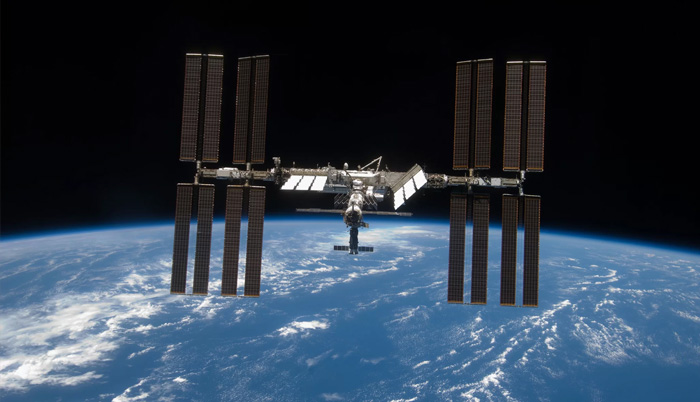![]() Home > Space & Science
Home > Space & Science
Congress Mulls Options for Space Station Beyond 2024

Funding the International Space Station beyond 2024 may hinder NASA's ability to get astronauts to Mars in the 2030s, some observers say. Credit: NASA
![]() March 23rd, 2017 | 10:54 AM |
March 23rd, 2017 | 10:54 AM | ![]() 1318 views
1318 views
SPACE.COM
The United States' ability to send astronauts to Mars in the mid-2030s depends in part on cutting back or ending government funding for the International Space Station (ISS) after 2024, the head of a congressional subcommittee that oversees NASA said Wednesday (March 22).
"We ought to be aware that remaining on the ISS [after 2024] will come at a cost," U.S. Rep. Brian Babin, a Texas Republican who chairs the House Science and Technology's Subcommittee on Space, said during a hearing about options and impacts for station operations beyond 2024.
"Tax dollars spent on the ISS will not be spent on destinations beyond low Earth orbit, including the moon and Mars," Babin said. "What opportunities will we miss if we maintain the status quo?
NASA currently spends about $3.5 billion a year on the space station program, including about $1.7 billion to transport crews and cargo, between $700 million and $800 million on research, and $1 billion on operations. An additional $1 billion comes from station partners Russia, Europe, Japan and Canada, NASA Associate Administrator Bill Gerstenmaier told the committee.
NASA's space station budget makes up roughly half of the agency's total spending on human space exploration programs, with the development of the Space Launch System (SLS) heavy-lift rocket and the Orion deep-space capsule accounting for most of the rest. The SLS and Orion costs are expected to continue at about the same levels beyond development and into manufacturing and operations, with a projected flight rate of about one per year beginning around 2023.
Gerstenmaier, who oversees NASA's human exploration programs, urged Congress to plan a smooth transition from the station to beyond-low-Earth-orbit initiatives, with an eye on preserving U.S. leadership in space, especially with China planning to launch a new space station in 2023.
A clear path forward also would allow NASA to better leverage the remaining time for station research and commercial initiatives, other participants in Wednesday's hearing said.
Mary Lynne Dittmar, executive director of the Coalition for Deep Space Exploration advocacy group, warned that ending the U.S.' efforts at the station too early could nix budding commercial space companies, some of which might eventually support the station's continued operation as a commercial outpost.
"Applications with strong market potential are emerging," Dittmar said. "Abandoning the ISS too soon will most certainly guarantee failure."
The time between basic research and the development of commercial markets often takes decades, Dittmar said, noting that it was 49 years between the invention of the integrated circuit and the iPhone.
"It's impossible to predict commercial activity that's based on research and innovation, but [what] we know are the kinds of conditions that you create to help bring that about," she said.
While Congress ponders the station's future, NASA should expand its partnerships with private companies, urged Eric Stallmer, president of the Commercial Spaceflight Federation, a Washington, D.C.-based industry association.
"The NASA investment[s] in these partnerships are already paying huge dividends," Stallmer said.
For example, by partnering with private companies, NASA has been able to cut its costs to fly cargo — and, soon, crew — to the station, compared with what it spent to operate its own fleet of space shuttles, which cost about $500 million per mission to fly.
Several of NASA's partners, in turn, have parlayed taxpayer investment into new products and services. For example, SpaceX brought back commercial satellite launch services to the United States.
The public-private partnerships also present a path forward for NASA as it looks to send astronauts beyond the station's orbit, Stallmer said.
Amazon founder and CEO Jeff Bezos' Blue Origin, for example, is proposing cargo delivery services to the moon to support NASA exploration and commercial endeavors.
Source:
courtesy of SPACE
by Irene Klotz
If you have any stories or news that you would like to share with the global online community, please feel free to share it with us by contacting us directly at [email protected]